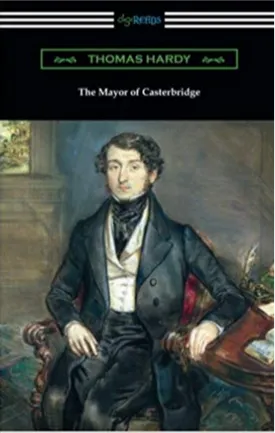The Mayor of Casterbridge by Thomas Hardy
The Mayor of Casterbridge, written by English novelist Thomas Hardy and published in 1886, is considered one of his greatest novels, one of the most exciting works of literature from the Victorian Age. Seen as a sort of nineteenth-century revenge tragedy, the novel tells the story of Michael Henchard, an ambitious and prosperous grain merchant whose fortune rises and falls due to his own pride and arrogance. Through Henchard’s actions, Hardy presents a powerful meditation on human nature and the power of fate.
The novel begins with an eighteen-year-old Henchard traveling to Casterbridge, a small market-town in western England, with his young wife and daughter, Elizabeth-Jane. While he is hiring a horse-cart, he impulsively decides to sell his wife and daughter to the highest bidder, announcing his intent to the crowd of people gathered in the market square. Drunk and desperate to make money, Henchard continues with the sale despite his wife's pleas, only to regret his decision the following morning when he wakes sober.
Henchard makes an immense fortune and rises to a prominent position in the community, eventually becoming mayor and the most successful businessman in Casterbridge. Despite his success, however, he is still plagued by guilt and regret over the sale of his wife and daughter. His reckless behavior leads him to make more poor decisions that start to slowly unravel his fortune. His greatest enemy is a man named Farfrae, a shrewd and brilliant Scottish grain merchant who often manages to outmaneuver Henchard in business.
When Elizabeth-Jane, who was adopted by the people who purchased her from Henchard, comes to Casterbridge to find her unknown father, she falls in love with Farfrae, much to the chagrin of Henchard who, although his feelings for his daughter have mellowed, still wishes to maintain a degree of control over her life. Meanwhile, Lucetta Templeman, a wealthy socialite who is admired by both Henchard and Farfrae, enters the picture and complicates matters even further.
Henchard goes into a downward spiral as Farfrae begins to surpass him in every area of life. His pride and arrogance prevent him from accepting his diminished status, leading him to make a series of increasingly desperate decisions that only further aggravate his situation. Eventually, he realizes that all of his pride and ambition have led him to his current downfall and takes some solace in his daughter, whom he has finally fully accepted into his life.
The novel ends with Henchard in the town hospital, alone and approaching death. His life has come full circle, as he realizes the true consequences of his actions - he has nothing and no one left. Through Henchard’s journey, Hardy carefully examines how too much ambition and pride can lead to dire consequences and how, ultimately, we are all accountable for our own destiny.
The Mayor of Casterbridge is a moving and engaging story, filled with complex characters and exciting plot twists. It is an excellent example of Hardy’s ability to merge his skillful mastery of the English language with his fascination with the intricacies of the human condition and our ability to fall victim to the negative effects of our pride and ambition. Although it has been more than a hundred years since Thomas Hardy wrote this powerful novel, its themes and consequences are still relevant today.

